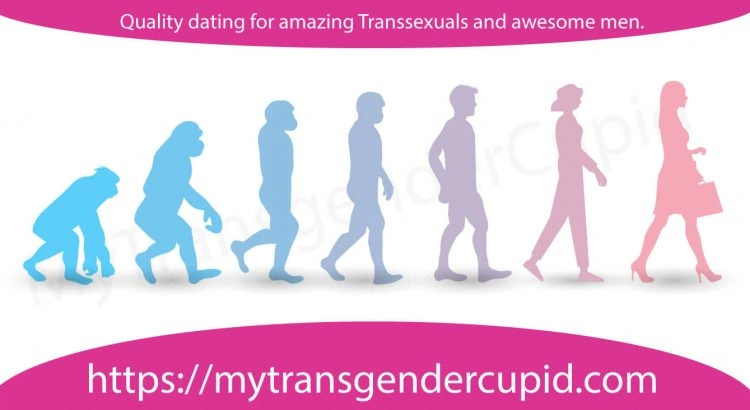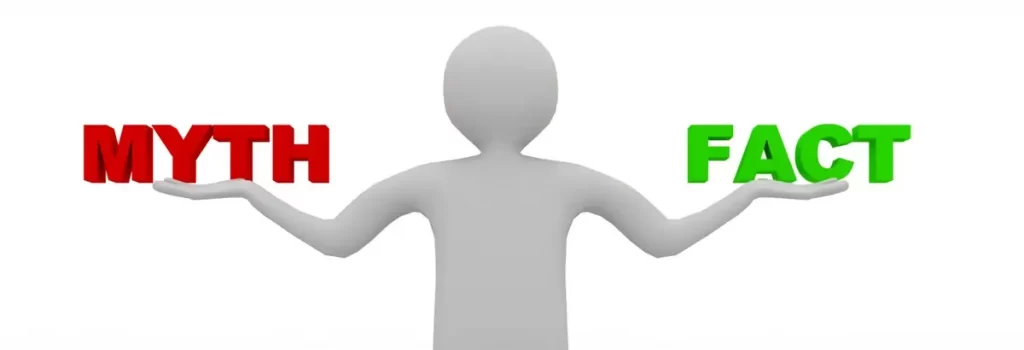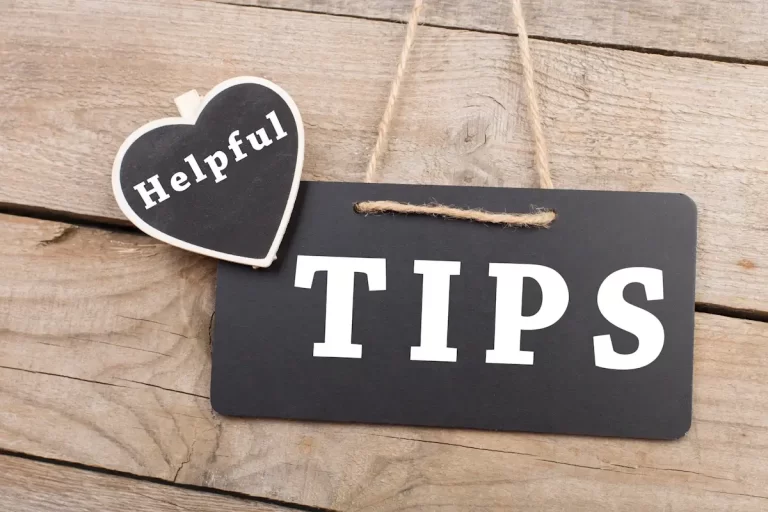Dating a trans woman can come with a lot of misconceptions, but it doesn't have to be that way. You don't need to be an expert to date a trans woman, but it's important to be respectful and open-minded. In this article, we'll debunk the top 12 myths and misconceptions about dating a trans woman. We'll cover everything from misconceptions about gender dysphoria and transitioning, hormone replacement therapy, relationships, and sexuality, to the myths and misconceptions about trans women. You'll gain a better understanding of trans issues and learn how to challenge harmful assumptions. Let's dive in and learn how to respectfully and empathetically date a trans woman.
Myth 1: Transgender Women Are Just Confused Gay Men
This misconception couldn't be further from the truth; transgender women are not simply confused with gay men. Transgender women have felt a deep-rooted discomfort with their assigned gender since childhood and have faced anxiety due to the incongruity between their gender identity and their sex. Gender dysphoria, a symptom of Gender Identity Disorder (GID), is the phenomenon at play. Transitioning helps these women to alleviate their anxiety and feel more comfortable in their own bodies by undergoing hormone replacement therapy (HRT) and making changes to their outward appearance. HRT can bring major changes to the body, such as softening of the skin, enlarged pupils, changed hair texture, altered fat distribution, and breast development.
Gender and sex, two distinct concepts, shouldn't be confused. Gender identity is an innate sense of self, independent of chromosomal sex, while sex refers to physical characteristics determined by chromosomes. While Gender expression, which varies significantly among individuals, is culturally mediated and doesn't dictate sex. The idea that transgender women are just men in dresses is false and ignores the complexity of gender identity and expression.
Transitioning is a complex, emotionally harrowing process that requires immense strength and courage. Transitioning isn't about 'becoming a woman,' but rather alleviating gender dysphoria-related distress. It is not a quick and easy process, but rather a long and difficult road that involves recovery time, pain, blood, dilation, bandages, and packing. Transitioning is a re-sexing of the body, not a de-sexing. Understanding this clarifies that transgender women aren't just confused gay men, but individuals with their own unique gender identities. Moving forward, it is important to challenge harmful assumptions and educate ourselves about transgender issues.

Myth 2: Gender and Sex Are the Same Thing
Sex and gender, though often used interchangeably, are distinct concepts that we shouldn't confuse. Like two sides of a coin, gender represents a social construct typically assigned at birth, while sex refers to a biological concept. Beyond the male-female binary, gender is a spectrum, whereas sexuality is usually perceived as a straight-gay binary. Keep in mind that gender identity and sexual orientation are separate concepts that shouldn't be conflated.
Transitioning from one gender to another involves more than a simple exchange. It's a multifaceted, often challenging process encompassing medical, legal, and social aspects. Remember that not every transgender individual chooses to transition, and gender identity doesn't necessarily correlate with sexual orientation.
Transwomen are diverse individuals who come from a variety of backgrounds and have different sexual orientations. Some trans women may be attracted to men, some may be attracted to women, and some may be attracted to both. It is important to remember that trans women are individuals with unique personalities and preferences that vary from person to person. Furthermore, it is important to recognize and respect the decisions of trans women regarding the disclosure of their gender identity. By recognizing the humanity of trans women, we can create a more inclusive and accepting society. With this in mind, let us move on to the next myth about trans women.
Myth 3: Trans Women Are Attracted Only to Men
Trans women come in all shapes, sizes, and sexual orientations, with some attracted to men, some to women, and some to both. The myth that trans women only find men attractive is false, as their assigned sex doesn't dictate their sexuality. Many trans women experience attraction to people of their assigned sex, identifying as lesbian, bisexual, pansexual, trans men, or non-binary. As society becomes more open and tolerant, trans women are finding it easier to openly express their sexual orientations without fear of discrimination. In locker rooms, for instance, trans women should be allowed to use the facilities that match their gender identity, not their assigned sex.
Understanding the Impact of Hormone Replacement Therapy on Trans Women’s Libido and Embracing Their Unique Experiences
Hormone replacement therapy (HRT) can often change a trans woman's sex drive, as it can increase or decrease their libido. This can have a profound effect on their sexuality as they may be more or less attracted to certain genders. It is important to remember that all trans women have different experiences with HRT and that their sexuality is not static. Keep in mind that gender identity, not sexuality, defines trans women. As multifaceted individuals with unique experiences and preferences, they deserve respect and acceptance, free from judgment or discrimination based on sexual orientation.
Trans women should be respected and accepted, regardless of their sexuality. It is important to recognize that trans women come from many different backgrounds and have many different sexual orientations. It is not our place to judge or assume that all trans women have the same desires or experiences. We should strive to create an environment where trans women feel safe and accepted, regardless of their sexuality. This will allow them to fully express themselves and embrace their identities without fear of judgment or discrimination.
Myth 4: All Transwomen Have Had a Sex Change Surgery
Not all transwomen choose to undergo sex reassignment surgery, as the decision is highly personal and dictated by the level of dysphoria towards the genitals and privates. Sex reassignment surgery (SRS) is a major, life-altering process that changes a person's biological sex. It is a complex and expensive procedure, and there is no guarantee of success or satisfaction. For many, SRS is not a viable or desirable option. Additionally, gender transition is not solely about physical transformation, and many trans women choose not to have SRS even if they have the resources to do so.
Transition is about finding a balance between the physical and psychological aspects of gender identity, and for some, gender dysphoria can be resolved without SRS. Athletics, teaching, journalism, and running for office are just a few of the activities that many trans women engage in without undergoing SRS. Moreover, trans women can be asexual, poly, straight, or gay without having to undergo SRS. It is important to understand that transitioning is not a one-size-fits-all process and that different strokes work for different folks.
Transitioning is a complex, personal journey that is unique to each individual. Some trans women choose to undergo SRS, while others do not. The decision to transition is not driven by a desire to conform to societal norms but by a person's sense of self and relationship to their body. The myth that trans women are just gay men in dresses is false, as gender identity and gender expression are distinct. It is important to challenge the harmful assumptions and myths around transitioning and to respect the decisions of those who choose to transition. The transition should not be viewed as a simple or easy process, but rather as a brave and courageous journey of self-acceptance and growth.

Myth 5: Trans Women’s Appearance Is Purely Cosmetic
Transitioning is not a superficial transformation, but rather a courageous journey of self-discovery and growth. It is not just about changing one's appearance, but also about the attitudinal, biological, and hormonal changes that occur due to the altered state of being. The decision to transition is usually made after much contemplation and consideration of the consequences. It is a process that requires a great deal of persistence and courage in order to overcome any feelings of doubt or insecurity.
Hormones play a major role in the process of transitioning and they are used to alter the body's biology in order to match the individual's gender identity. The hormones can cause the body to change in many ways, including the development of breasts, changes in fat distribution, a softer skin tone, increased body hair, and a deepening of the voice. In addition, hormone replacement therapy can also affect genital development, though this is not always the case.
Transition is not just about altering one's physical appearance, but also about becoming more comfortable with one's identity and self-expression. It is a journey that is unique to each individual and can take many forms. While some trans women choose to have surgery or take hormones, many do not and still identify as female. No matter what path they choose, they deserve to be respected and accepted for who they are.
Myth 6: Attraction to Trans Women Means You’re Gay
The misconception that attraction to a trans woman equates to being gay is all too common. This is simply not true. Trans women are individuals with a variety of gender identities and attractions, just like any other human being. Many trans women identify as bisexual, lesbian, queer, or any other gender identity that does not revolve around a penis. Just because a trans woman has a penis does not mean that she is male. It's important to remember that gender identity is distinct from gender expression and is related to an individual's innate sense of self. Trans women possess unique gender identities and shouldn't face judgment or labels based on societal expectations.
This flawed idea stems from harmful assumptions about gender identity and expression. This assumption is false and dismisses the validity of the trans woman's gender identity. It's important to challenge these harmful assumptions and educate oneself on the complexity of gender identity and sexuality. Remember that cultural influences greatly mediate gender expression, which varies significantly among individuals.
It's important to recognize the diversity of gender identity and expression in the LGBTQ+ community and to respect and accept trans women for who they are. Transwomen, like everyone else, have diverse preferences and aspirations. Attraction to a trans woman doesn't inherently make someone gay. By challenging harmful assumptions and educating ourselves about gender identity and expression, we can create a more inclusive and understanding environment for trans women. As we move forward into a world that is becoming more accepting of the LGBTQ+ community, it's essential to remember that trans women have the right to make decisions about their own bodies and gender identity.
Myth 7: All Trans Women Want to Hide Their Past
You may have heard that all trans women want to hide their past, but that is simply not the case. Some trans women are open about their transition and want to share their stories with the world, while others may feel uncomfortable, embarrassed, or even ashamed. There is no one-size-fits-all approach when it comes to dealing with the stigma of being transgender. Each trans woman's level of comfort discussing her past varies, and we should respect their decision to share or withhold their story.
From hormones to locker rooms, there is a multitude of factors that can contribute to a trans woman's decision to keep her past private. Some may fear judgment, while others worry about potential repercussions at work or within their community. Recognize that each trans woman's experience is unique, and no one deserves judgment for their choices.
Transitioning is a personal journey, and every trans woman has different needs when it comes to disclosure. Some may be open and vocal about their past, while others may prefer to keep it private. Respect for each individual is important, no matter their decision. Understanding and respecting the deeply personal decision to disclose or conceal one's past is crucial for everyone.
| Pro Tip |
|---|
| Unravel the Mysteries of Transgender Dating: Are you new to the transgender dating scene or just looking to improve your game? Check out our comprehensive guide on Navigating the Transgender Dating Scene for expert advice on how to build meaningful connections and find your perfect match. |
Myth 8: Dating a Trans Woman Is Just a Fetish
Dating someone who is trans is not just a way to fulfill a fetish; it's a way to form a meaningful connection with another human being. Trans women are people too and they should be treated like any other person. It's important to be mindful of their behavior, dress, hormonal needs, and mental health, just like any other person. Trans women often face social stigma and judgment, and it's important to be understanding and to not put them in the same box as people with a fetish.
It's important to remember that there is more to trans women than just their gender identity. They have interests, hobbies, and dreams, just like anyone else. They are more than just their gender identity, and it's important to recognize and respect that. Trans women have a wide range of experiences and a variety of ways of expressing themselves. It's important to be respectful of their identity and not to make assumptions based on stereotypes.
Trans dating involves the same care and respects that any other relationship would. It's important to be aware of the social and cultural implications of being in a relationship with a trans woman and to remember that not everyone may be accepting of the relationship. It's also important to take into account the mental health and hormonal needs of the trans woman and to be supportive throughout the process. Taking all these things into account will help create a strong and supportive relationship. Step, transitioning changes most of our relationships with sexuality.
Myth 9: Trans Women Can’t Experience Penile Erections
With hormone replacement therapy, trans women can experience erections just like any other person. Estrogen, the primary hormone for female transition, does not necessarily mean trans women cannot enjoy sexual satisfaction. In fact, the spectrum of sexual experience is just as broad for trans women as it is for cisgender individuals. The variance in each individual's sexual experience should be respected and accepted regardless of gender identity.
Trans women may even opt for reassignment surgery to further their transition. While this is a personal choice, it is not necessary for sexual satisfaction. Trans women can experience full erections and orgasms without any surgery.
Acceptance of the individual's own body is the key factor in allowing any trans woman to experience sexual pleasure. No two trans women will have the same sexual experience or desires, so it is important to be open to the possibilities and respect the choices of each individual.

Myth 10: Trans Women Are Always Unhappy and Dysfunctional
Contrary to popular belief, trans women are not always struggling to find joy and fulfillment in life; rather, they are as diverse and unique as the stars in the sky, each blazing their own unique path. Many trans women experience breast development and other physical changes due to hormone replacement therapy, as well as emotional changes that come with discovering and expressing their true gender identity. This does not mean that trans women are inherently dysfunctional or unhappy; rather, it is a natural part of their process of discovering and exploring their gender identity.
At the same time, it is important to recognize that many trans women struggle with dysphoria, depression, anxiety, and other mental health issues, just as many people of different genders can. This is not a disorder, but rather a reflection of the fact that transitioning can be a difficult process and that many trans women may have to deal with discrimination and adversity. It is important to remember that all people, regardless of gender identity, can experience mental health issues and that these are not necessarily linked to being trans.
The key is to recognize and respect the diversity of experiences of trans women. Each one is unique and has its own individual needs and preferences. The best way to show solidarity and support is to offer understanding and acceptance and to recognize the complexity of the journey that many trans women face in order to reach a place of well-being. From here, we can move forward to challenge the misconceptions and assumptions that can be damaging to the trans community.
Myth 11: Trans Women Are Easy to Spot
You may have heard the myth that trans women are easy to spot due to their gender identity. This is simply not true - it is nearly impossible to spot a trans woman in a crowd, and even if you did, it would not necessarily mean that she is a trans woman. In fact, many trans women do their best to blend in with other cis women and men in order to avoid discrimination and judgment. Trans women do not have to subscribe to a certain norm in order to be considered authentic.
The truth is, trans women come in all shapes, sizes, and forms. Some may choose to dress in a more traditionally "feminine" way, but this does not mean that all trans women adhere to the same aesthetic. Many trans women choose to dress however they feel comfortable - which could range from a traditionally masculine style to a more androgynous look. Ultimately, the way a trans woman presents herself is a personal choice.
Dating a trans woman does not have to be any different from dating a cis woman. Trans women are just as capable of forming meaningful relationships as any other woman or man. It is important to remember that we all have different stories, experiences, and beliefs, and it is up to us to respect and accept one another's differences. With an open mind, trans women can find love and acceptance in all sorts of places - and so can you.
Myth 12: Trans Women Are Desperate for Relationships
Despite what some may think, trans women aren't desperate for relationships - they just want to be loved and accepted like anyone else. This myth implies that trans women are somehow “less than” cisgender individuals when it comes to relationships, which is simply not true. Trans women go through the same process of finding a partner, getting to know them, and building a relationship as everyone else. Here are a few points to consider when it comes to this myth:
- Trans women have the same needs and desires as any other woman when it comes to relationships, and they should be afforded the same quality of life and relationships as their cis counterparts.
- Trans women should not have to face the added pressure of having to disclose their gender identity before they are ready.
- Transitioning is not a prerequisite for finding love and happiness, and trans women should not feel obligated to do so in order to be accepted.
The implication that trans women are desperate for relationships is both false and damaging. Trans women, like all women, deserve to be loved and accepted in all aspects of their lives, and it is important to remember that they are individuals who should be judged on their merits, not their gender identity. It is only by building understanding and challenging stereotypes that we can create a more inclusive, accepting society for all.
| Pro Tip |
|---|
| Witness the beauty of love transcending boundaries as we explore the dynamics of dating cisgender and trans women together. Read our article: Difference in Dating Trans Women and Genetic Women |
Conclusion: Building Understanding and Challenging Stereotypes
By broadening our understanding and breaking down pre-conceived notions, we can embrace the unique beauty of trans women and create a more inclusive world that celebrates their place in our society. It's important to respect every individual's wishes regarding the disclosure of trans status and to be tolerant of different gender expressions. Society is changing, and there are so many people out there who accept trans individuals for who they are. There is no single way to dictate how a trans woman should look or behave, and each individual has the right to make decisions based on their own needs and preferences.
The media often portrays transition inaccurately, and it’s important to challenge these harmful assumptions about gender identity and expression. Pushing someone out of the closet can be damaging to their long-term progress, and it’s not the responsibility of trans individuals to disclose their gender identity to potential partners. It is vital to maintain our own safety first and foremost, while also being mindful of the potential consequences of our actions.
Transitioning is a long and complex process, but with support and understanding, it can be a journey to self-acceptance and happiness. Transgender individuals deserve respect and support in their journey toward self-acceptance and happiness. With increased education and understanding, we can create a more tolerant and accepting society for trans women and all gender-variant individuals.




